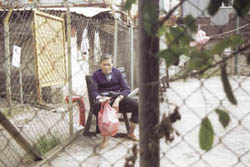|
Tai Hom Village in Diamond Hill was one of the largest squatter
areas in Hong Kong. The village, which had very low living standards,
was bounded by heavy traffic, industrial estates and private housing
blocks.
Its history dates back to 1715. The 200-year-old village survived
through many phases of Hong Kong’s history.
For instance, part of the village was once used as a base for Japanese
fighter planes and bombers during World War II.
In its heyday, the village housed about 2,500 residents. Markets,
restaurants and an orchid nursery prospered in the village. A local
fire brigade was set up because the village often caught fire. Volunteer
firemen conducted regular fire drills.
Many villagers spent most of their lives in the village, raising
children and grandchildren there.
Recently a gloom fell over the community when the government announced
that it would raze the village. As villagers moved out, there were
many vacant houses and few people. The last ones to leave were mainly
elderly. They gave up their hold on the village only reluctantly.
The village was torn down last month to make room for a “green
estate” and schools.
The memory remains, but the the village has now vanished in the
midst of the urban landscape. 
|

 Online
Edition
Online
Edition